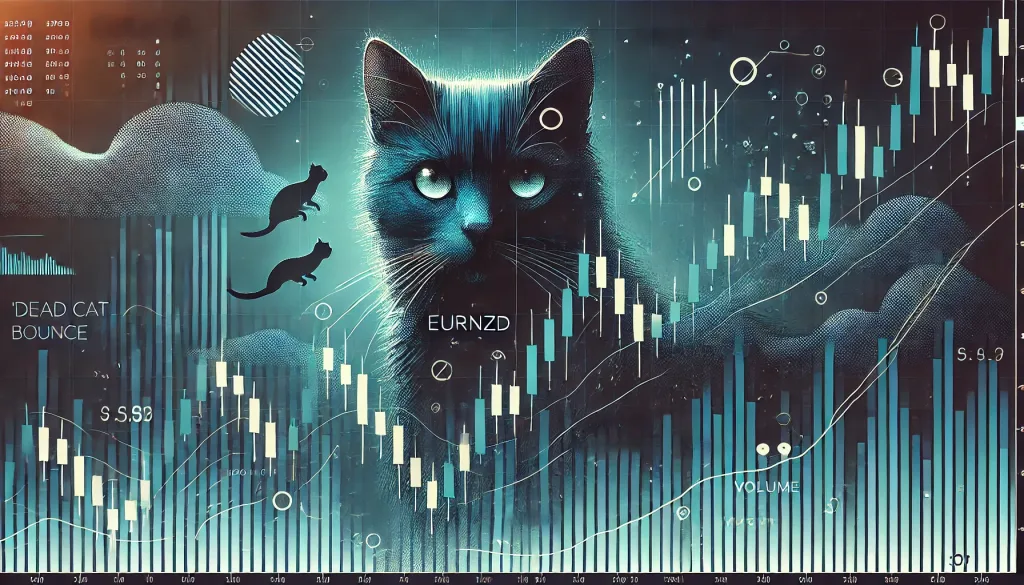The EURNZD Dead Cat Bounce: Why This Sneaky Setup Traps Traders (And How to Flip It in Your Favor)

When the Cat Bounces… But It Ain’t Alive
Picture this: You buy EURNZD after a steep drop, convinced it’s about to rebound. It bounces, you celebrate… and then it tanks again, harder than your hopes after buying crypto at the top. Welcome to the world of the dead cat bounce—a cruel trick the market plays, especially on those chasing quick reversals.
But here’s where the pros separate from the hopefuls. What if I told you that this dreaded bounce can become your secret weapon? You just need to know where the hidden doors are.
Let’s crack open the vault.
What Exactly Is a Dead Cat Bounce on EURNZD? (No Cats Were Harmed)
A dead cat bounce refers to a temporary recovery after a sharp decline, fooling traders into thinking the downtrend is over. Spoiler: It’s not. The price drops again, leaving dip-buyers holding the bag.
EURNZD, being a cross pair prone to volatility and erratic swings, is fertile ground for this pattern. The pair often reacts violently to Eurozone and New Zealand economic divergences, setting up perfect traps for the unprepared.
Why EURNZD Loves to Fake You Out
- Low Liquidity Trickery: Compared to majors, EURNZD sees lower trading volumes. This amplifies price moves and creates more fake recoveries.
- Commodity-Currency Twists: New Zealand’s dollar (NZD) often dances to dairy prices and risk sentiment. Meanwhile, the Euro reacts to ECB decisions and political drama. When these worlds collide, the price action becomes a soap opera.
- Session Overlaps: EURNZD can whipsaw wildly during London’s close and the Asia-Pacific open, catching traders off-guard.
The Hidden Formula: Spotting the ‘Real’ Dead Cat Bounce on EURNZD
How do you distinguish a real recovery from a fake bounce? Here’s the elite checklist:
- Volume Divergence: A bounce without increased volume is often a trap. Smart money isn’t buying—retail traders are.
- Fib Retracement Sweet Spot: Measure the initial drop. If the bounce struggles near the 38.2% or 50% retracement, the cat’s not alive. Real recoveries often breach the 61.8% level.
- MACD Bull Trap: If MACD gives a weak bullish crossover while the histogram remains under zero, you’re likely in bounce territory.
- Time Duration: Real reversals take time to consolidate. A quick pop followed by hesitation? That’s feline gymnastics.
Ninja Tactic: Flip the Bounce into Profit
This is where you break free from the crowd. When others chase the rebound, you prepare to short it.
Execution Playbook:
- Wait for the Bounce to Stall: Use the 1-hour or 4-hour chart. If the bounce hits resistance (e.g., a former support level), start watching closely.
- Engulfing Candle Confirmation: Look for a bearish engulfing candle—sellers overpowering buyers.
- Place a Short: Enter just below the engulfing candle’s low.
- Stop Loss Above Resistance: Place it slightly above the bounce peak.
- Target the Recent Low: Aim for the previous swing low or beyond, as dead cat bounces often lead to fresh lows.
Underground Trend: Leveraging Sentiment Indicators
Few traders realize this, but EURNZD’s bounces often align with extreme sentiment readings.
- Retail Long Overload: If 70%+ of retail traders are long after a bounce (check Myfxbook or IG sentiment tools), it’s a red flag. The herd is usually wrong.
- COT Report Clues: Large speculators trimming EUR longs or increasing NZD shorts signal institutional alignment with the bounce-fade play.
Expert Insights: What the Pros Say
David Belle, founder of Macrodesiac, emphasizes, “Retail traders often mistake noise for opportunity. Cross pairs like EURNZD exploit this tendency. Always check volume and institutional positioning before assuming a reversal.” (source)
Justin Bennett, market analyst at Daily Price Action, adds, “Dead cat bounces thrive on emotion. Patience is your weapon. Let the fake rally peak before acting.” (source)
Real-World Example: EURNZD’s Bounce Trap in 2024
In January 2024, EURNZD plunged on Eurozone recession fears. A swift 120-pip bounce lured traders in. However, volume was weak, and sentiment data showed 75% of retail traders long. Predictably, the pair collapsed another 180 pips within two days.
Lesson? Weak bounces often precede deeper drops.
Master Move: Confluence for the Win
When you stack multiple factors, your win rate skyrockets:
- Volume divergence
- Fib resistance
- Sentiment overload
- Bearish engulfing candle
Combining these creates sniper-level entries. You’re no longer guessing; you’re orchestrating high-probability setups.
Final Word: Outsmart the Market’s Fakeouts
The dead cat bounce is a predator. But armed with these elite tactics, you flip the script. While others chase rebounds, you wait, analyze, and strike with precision.
Want more game-changing strategies?
- Get daily market updates (Forex News Today).
- Sharpen your skills (Free Forex Courses).
- Join the pros (StarseedFX Community).
Your edge is waiting. Claim it.
—————–
Image Credits: Cover image at the top is AI-generated
PLEASE NOTE: This is not trading advice. It is educational content. Markets are influenced by numerous factors, and their reactions can vary each time.

Anne Durrell & Mo
About the Author
Anne Durrell (aka Anne Abouzeid), a former teacher, has a unique talent for transforming complex Forex concepts into something easy, accessible, and even fun. With a blend of humor and in-depth market insight, Anne makes learning about Forex both enlightening and entertaining. She began her trading journey alongside her husband, Mohamed Abouzeid, and they have now been trading full-time for over 12 years.
Anne loves writing and sharing her expertise. For those new to trading, she provides a variety of free forex courses on StarseedFX. If you enjoy the content and want to support her work, consider joining The StarseedFX Community, where you will get daily market insights and trading alerts.
Share This Articles
Recent Articles
The GBP/NZD Magic Trick: How Genetic Algorithms Can Transform Your Forex Strategy
The British Pound-New Zealand Dollar: Genetic Algorithms and the Hidden Forces Shaping Currency Pairs
Chande Momentum Oscillator Hack for AUD/JPY
The Forgotten Momentum Trick That’s Quietly Dominating AUD/JPY Why Most Traders Miss the Signal
Bearish Market Hack HFT Firms Hope You’ll Never Learn
The One Bearish Market Hack High Frequency Traders Don't Want You to Know The

